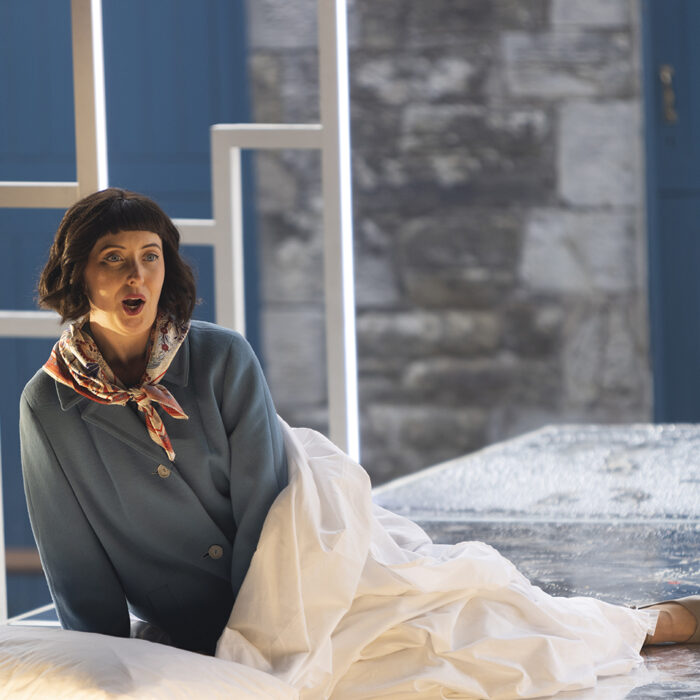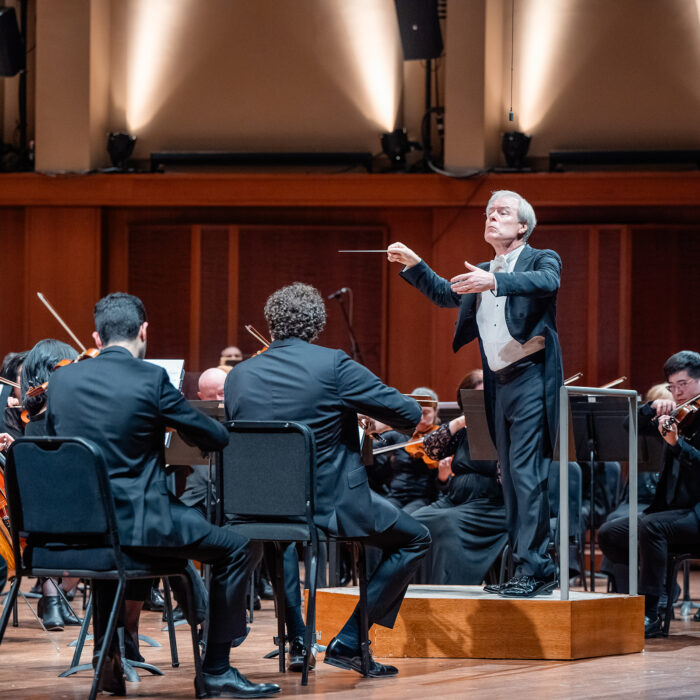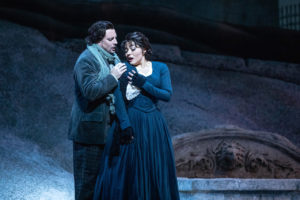
Metropolitan Opera 2019-20 Review: La Bohème
Ailyn Pérez & Matthew Polenzani Are Golden In Revival Of Puccini Classic
By Francisco SalazarFranco Zeffirelli’s production of Puccini’s “La Bohème” is back at the Metropolitan Opera. It’s big, grand and a crowdpleaser thats gets reaction from the audience, particularly at the opening of Acts two and three. It’s well-known for its detailed, classic take on the opera and is the most staged production in the Met’s repertory. Since its premiere in 1981 the production has only missed two seasons.
With so many revivals, the production has sometimes fallen into the trap of feeling routine with by the numbers performances unable to bring this masterpiece to life.
But for this season’s revival the Met has lined up a bright young cast filled with energy and with enough experience in the roles to immerse us in the pain and glory of “La Bohème.”
Undeniable Chemistry
In the roles of Mimì and Rodolfo, Matthew Polenzani and Ailyn Perez showcased incredible chemistry that allowed the story to flow with ease and made the final moments heartbreaking. Unlike most who portray these roles, their interpretations of Mimì and Rodolfo imbued the lovers with a sense of inexperience in love, but not quite naive innocence. Every gesture drove their interaction, keeping you fully invested in their emotional development.
From the moment Mimì entered, the two flirted openly with one another; after fainting, Perez’s Mimì was fully of energy and glanced over at Polenzani’s Rodolfo with a coquettish smile. He couldn’t take his eyes off of her and moved about awkwardly as if trying to find the right words to keep the tension building. As she was leaving and realized she had lost her key, Perez’s Mimì blew out the candle, prolonging the flirting game. As they both looked for the key, they continued to glance over at each other, clearly more interested in one another than the Macguffin they were looking out for. It was a playful exchange that ended in Rodolfo taking her hand. But rather than Mimi being stunned by the action, Perez’s Mimì smiled as if she finally got his full attention. That playfulness continued into the duet and arias as they both maintained the consistent eye contact, completely captured by each gesture and stare. That game ended during the duet when Perez’s Mimì finally planted a kiss on Polenzani’s Rodolfo.
Their relationship continued to develop in the subsequent acts and in many ways they continued to flirt even as they said goodbye in Act three. Both vividly gave warm smiles on their faces as they looked at each other and reminisced about the happy times. They embraced, holding onto the moment; as Act three came to a close rather than sit on the fountain, they looked up at the snow falling and stood at the front of the stage smiling at each other tenderly.
In Act four, that playful quality continued through their exchange in “Sono andati.” Even as Perez’s Mimì weakened, she maintained that expressive smile on her face. The changes in the music as they went from motifs to the next also saw both singer shape the text as if it were dialogue rather than sung music, and they continued flirting, particularly in the recapitulation of “Che gelada manina.” Polenzani took her hand with care and Perez let him embrace it with delicacy. There was also a final kiss during this scene that emphasized how inseparable these two were regardless of their separation.
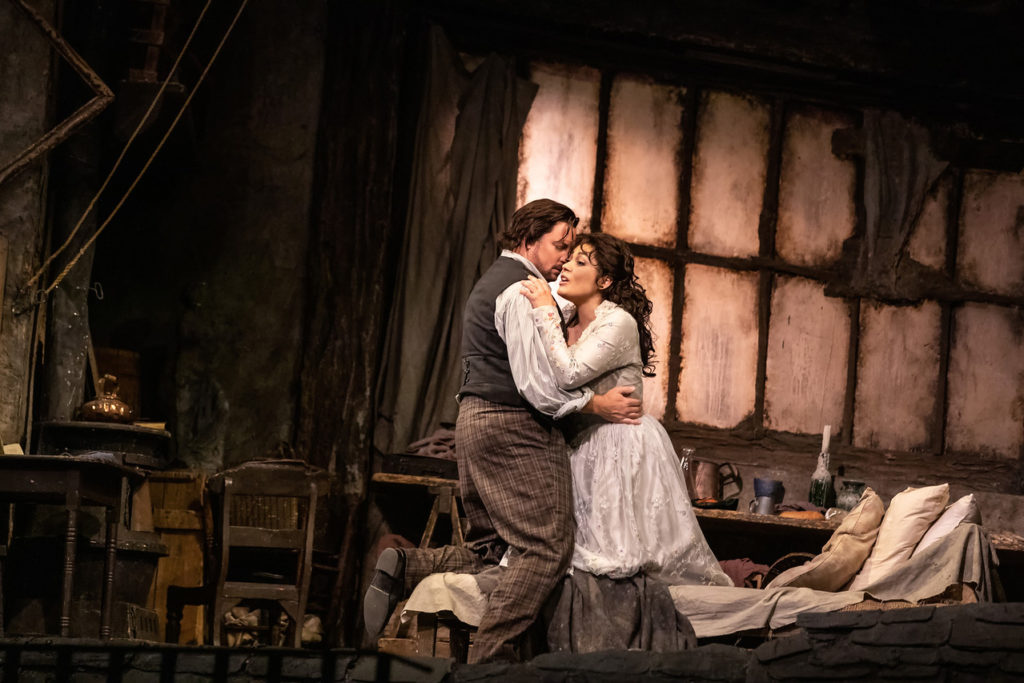
(Credit: Evan Zimmerman)
Vocal Highlights
Vocally, Perez was in stronger shape on this evening.
Her Mimì continues to grow and find different shades that one would never expect. One thing that Perez did this time was make Mimì ill from the start. She entered coughing and fainting immediately. The voice had a tenderness to it that emphasized an ill Mimì. She continued to bring that out in “Mi chiamano Mimì” after the phrase “il primo bacio dell’aprile è mio,” she let out a gasp and coughed during the final moments of the aria. It was revealing and yet subtle.
But the overall shape of the aria was quite fascinating. Perez shaped the phrases with roundness and fluidity as if she were narrating a story. Nothing was taken for granted as she gave a few spaces between phrase and melody as if Mimì was think of what to say next. The purity of the sound continued to rise and melt into each bar until she got to the climactic moment “ma quando vien lo sego,” where her voice projected with a gorgeous forte into the hall. One particular moment in the aria that stood out was the phrase “di primavere” as Perez began with a piano and crescendoed to a forte before decrescendoing it. It was quite magical and allowed for the unpredictability of the aria. In “O Soave Fanciulla,” Perez’s timbre took on a brightness that one immediately forgot about the ill Mimì.
In Act three, Perez’s voice brought darker shades that were emphasized in her duet with Marcello. She sang with a subtlety that emphasized the desperation in Mimì but also her weakened state. Whereas one expects the soprano to let the fullness of her sound out here, Perez held back giving a somewhat restrained performance. But that didn’t take away from the emotion of the scene.
Her “Donde Lieta Usci” was also a showcase of gorgeous piano singing with immaculate legato phrasing that continuously grew in volume. But her most impressive singing came as she ended the aria. She held out the “Senza” as if not wanting to let go of the note and then when she arrived at “Rancor,” she slowly decrescendoed with the sound dying out.
In “Sono Andati,” Perez sang with a soft timbre that continued to die out as the scene played out. Her voice weakening and moved toward a parlando style. During the fourth Act it was the phrase “Se Rinasce” where the voice blossomed and you could hear that glimpse of brightness from the previous acts.
Polenzani had a an overall success as Rodolfo. His voice has grown in volume and in heft but it has also lost some brightness, particularly at the top. He tends to go flat when he reaches the top register and his overall sound production is a bit dry. However, that did not prevent him from giving a heart wrenching portrayal of the dreamy poet.
His opening “Che Gelida Manina” was sung with such ardent tone and an attention to diction. Like Perez, one sensed that he was narrating a story as he glanced over at her while singing each phrase. Polenzani gave delicacy to the aria singing with a piano sound that he has become well-known for and extending notes in a virtuosic way all while maintaining a bright and suave tone. His climactic High C gleamed throughout the auditorium in what was an arrival for the tenor. That brightness continued in “O Suave Fanciulla” and throughout the second act, the sound blending beautifully with Perez’s creamy voice. What was impressive was the way both were able to sing the pianissimos together without covering each other and always creating a beautiful balance in the music.
In Act three, Polezani finally got a chance to show the passionate and dark side to his Rodolfo. His aria “Mimì e uno civetta” started out as if he was trying to find an excuse to break up with Mimì and in many ways showed the youthful and immaturity to Polenzani’s Rodolfo. However, as the aria continued in the phrase “Una terrible tosse,” one sensed the torment in Polenzani as his his voice obtained a darker timbre and his singing took on a brooding tone. Here was the moment where the tenor sang with all his power and one could sense he was overexerting his tenor, with the voice losing luster and taking on a graininess. But still it was heart-wrenching seeing his suffering throughout the scene. In the quartet at the end of Act three, Polenzani’s timbre regained that brightness, projecting more warmth and following Perez’s subtle pianos throughout the lush lines.
In Act four Polezani also sang with an ardent tenor that captured the youthful qualities of his first act. It was as if he was trying to relive the happier moments with Mimì and that made it even more heartbreaking. His final lines “Mimì…Mimì…” were truly sung with desperation and almost as if Rodolfo were crying.
Solid Supporting Cast
David Bizic reprised his role as Marcello and brought a youthful innocence to his portrayal that was capped with delicacy and a bright baritone.
His interchanges with Rodolfo brought out the playful quality as they started burning the poems and paintings and that continued to evolve throughout the night, particularly in Act two when Rodolfo gave him moral support as Marcello remembered Musetta. But once Musetta entered the scene he was clearly filled with jealousy. At one point Polenzani’s Rodolfo tied him up to the seat with his scarf and laughed at his insecurity. Bizic, defiant throughout this scene, took two girls from the chorus and roamed around the stage with swagger, attempting to get Musetta’s attention.
Their relationship continued to evolve into Act three as it was now Marcello who was giving Rodolfo support. Bizic sang with warmth and tenderness during the trio as Perez and Polenzani poured out the emotional core of the trio. He was the balance to it all.
Act four saw Bizic sing with warmth in the duet with Rodolfo, though he was more subtle with his sound, never really reaching a forte. It was as if he was attempting to keep his emotions in check. When he finally saw Musetta again, one could see a bright smile across his face and their final hug was comforting as there was still hope for the relationship. Interestingly like Mimì and Rodolfo, it was Musetta who took the initiative and felt like the stronger character in the relationship.
In the role of Musetta, Olga Kulchynska made an impression with her lush and soaring voice. While it wasn’t a revelatory interpretation, she lit up the stage from the moment she got on stage with her energetic stage presence while flirting with David Bizic’s Marcello, throwing plates on the floor, throwing her hat at Colline, and simply tricking Alcindoro into leaving so she could get back with Marcello.
Her “Quando M’en Vo” was sung with allure as she shaped each line with seductive quality starting with a piano dynamic and connecting each phrase with a slight ritardando while always moving the tempo forward. As the line crescendoed into the upper register so did her voice and volume. Her B naturals were quite impressive as she held them out and they soared over the immense orchestra and ensemble.
As she sang the aria, Kulchynska also moved about the stage, always looking at Marcello to see how she could either make him jealous as she flirted about with other men on stage and made every attempt to get him back.
But what was most impressive during the evening was Kulchynska’s take on Musetta’s prayer in Act four. This is by no means a showy place in the opera and it’s quite brief. But in this act there were no traces of that seductive and flighty girl from Act two. Kulchynska sang this moment with sentiment, emphasizing the text with a nuanced accent, almost as if she was hoping for a miracle. There was still that strength and gutsy quality as she shaped the line but the voice took on a rounded and warm quality. This made for an impactful moment that provided more depth to this character.
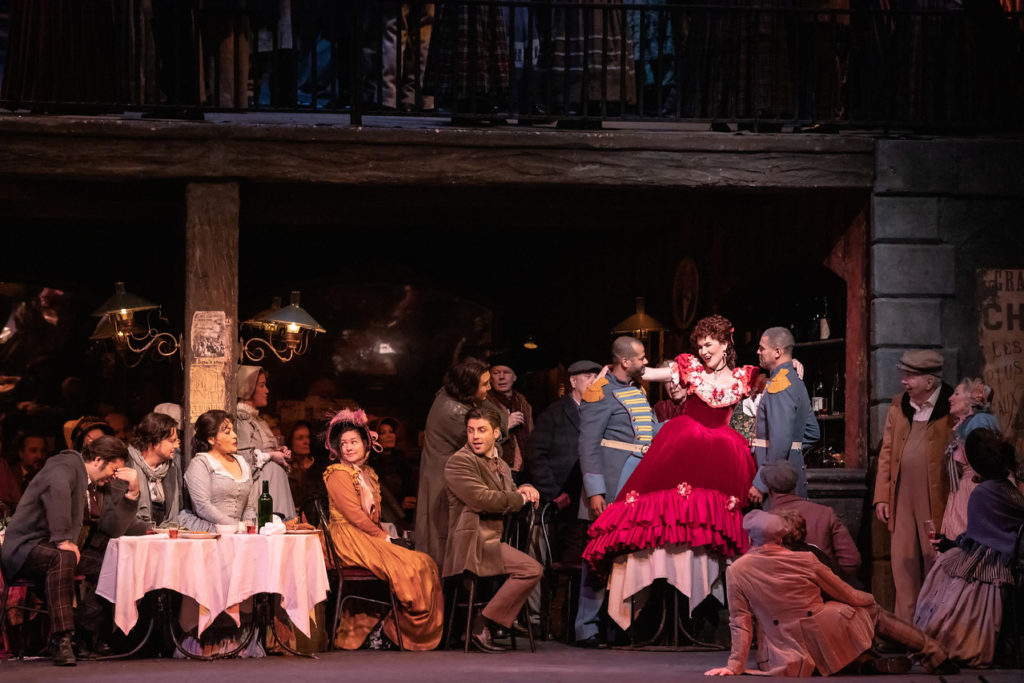
(Credit: Evan Zimmerman)
The Cavalry
Jongmin Park sang Colline with clarity and attention to detail and a giving a youthful quality to his portrayal. He danced, jumped and played around throughout the performance with great energy. His “Vecchio zimarra” was sung with a proper tone that boomed on the Met stage. His interpretation was quite subtle, never taking any moment to the extreme emotions and always remaining in mezza voce.
Andrey Zhilikhovsky brought an impressive baritone to the role of Schaunard. He doesn’t get any aria nor any virtuosic showpiece, but he does get to engage in the ensembles. During his exchanges in Act one, two and four, one could hear a promising voice that is more suited to bigger roles. Still, he managed to stand out in each moment providing energy on stage as he pranced around in Act four and attempted ballet moves. He had a sort of big brother quality, particularly in Act one as he protected the food he had obtained and put it away.
Arthur Woodley sang both Alcindoro and Benoit, giving each character a weariness with his voice.
In the pit Marco Armiliato provided a swift and layered reading that saw Puccini’s score soar into the hall with explosive sound. Unlike most conductors who tend to believe verismo is mannered and slow, Armiliato’s tempi were all about moving the drama forward and always find the dramatic quality in the score. This was most noticeable in the last act when the orchestra was a given a darker texture that foreshadowed Mimi’s impending death. During the opening two acts, the orchestra had brighter and more cheerful sound that was embodied on stage.
The one thing with Armiliato’s performance, however, was that he tended to cover his singers, particularly in the large ensembles like the Act two finale and the Act three quartet. Where Perez and Polenzani attempted to sing with a piano dynamic at the end of quartet, the violin’s sometimes overexerted themselves covering the singers’ gorgeous line. In this moment he also didn’t give them enough time to expand the line and it came off a bit rushed. He also had the tendency to cover the singers in the Act three trio between Mimi, Rodolfo, Marcello.
Overall however, the Metropolitan Opera has lined up a fresh cast that gave energy to Franco Zeffirelli’s classic production and which should provide audiences with a cathartic experience of this legendary score.


